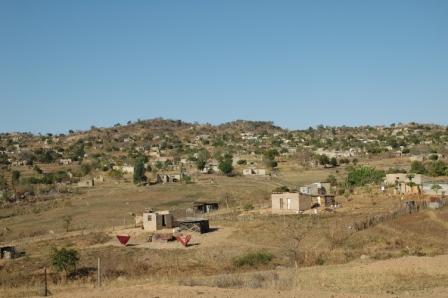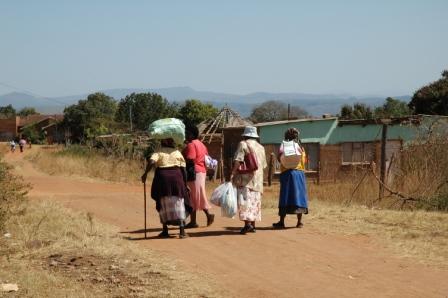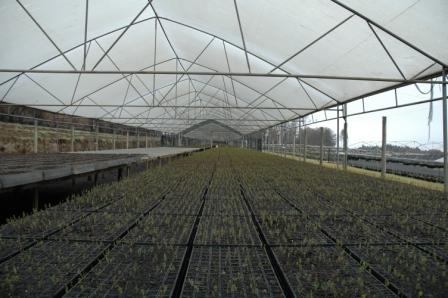
In a BBC commissioned poll released last week, 23,000 adults in 23 countries were interviewed regarding their choice for President of the United States. Barack Obama comes out the winner, but South Africa was notably absent from the poll.
Fourteen years ago, under the vision of Nelson Mandela, the institutionalization of apartheid was ended, but the country is still suffering from a leadership crisis and vitriol between its President, Thabo Mbeki, and his former Deputy President Jacob Zuma. Human rights watchers are calling upon the South African government to end its association with oppressive regimes in the region, especially that of neighboring Zimbabwe's Robert Mugabe.
The South African economy ranks 23rd in the world, with a growth rate of over 3 percent a year, and a budget deficit of only 1.5 percent. South Africa provides a distinct contrast to other African countries with its relatively booming economy, resultant regional influence, and large white population. Yet, South Africa is facing many challenges, not the least of which is the specter of HIV/AIDS, which is expected to devour an estimated six million black South Africans due to AIDS-related diseases over the next 10 years. An influx of refugees from Zimbabwe and neighboring nations has contributed to bouts of xenophobic violence over job competition in the Homeland areas surrounding Johannesburg.
Image: Homeland near White River, Mpumalanga Province; G. Nienaber
South Africa has important ties to the United States economy through its timber industry. This economic tie has been ignored in the American mainstream, but offers a unique insight regarding US economic policies and world trade markets.
This synergy becomes even more important when the impact of the fires of 2007 and 2008 are considered. York Timber (formerly Global Forest Products) suffered R 106 M in damages ($13,133,275.00) in 2007.
Image: Mpumalanga Province; G. Nienaber
As it happened, we were in South Africa during the RNC. Hurricane Gustav was aiming for South Louisiana, millions were displaced by flooding in India and wild weather and fires were threatening the Lowveld region that supports much of the South African timber industry. CNN International was covering the world events, but coverage stateside was focused on Gustav and the RNC.
"It's Like a War Zone Here," screamed the banner headline in the September 1 issue of the Star. The lede said, "Gale force winds, hail, snow and plummeting temperatures have brought disaster and death across the country." These disasters included "runaway' fires in KwaZulu Natal and Mpumalanga Provinces. Page four of the edition included a wire service summary of the Palin pick by the SAPA news agency.
Image: 2007 Wildfires Mpumalanga; Hans Mauritz
The price of oil, worldwide inflation, and rising interest rates, have caused a slowdown in demand for finished forest products in South Africa's residential and commercial construction sectors
York Timber CEO Lance Cooper says, "The jury is out in our view as to which candidate will better lead the US and turn the economy around and bring about greater international stability."
"I have been following the US election from a distance and my impression has been that the policies of both candidates are not dissimilar and that it's down to a choice of personalities, as opposed to major policy differences that will win or lose the election," Cooper added.
Dick Claunch, an American ex-Weyerhaeuser USA Timber Company executive who has resided in South Africa for the last 15 years, is a non-executive Director of York.
"The US economy, particularly the housing industry and related industries, seems to be such a mess right now that both candidates will have to attack this as their number one problem," Claunch wrote in an email.
"They undoubtedly will approach the problem from different angles, but the result must of necessity be the same. I think the jury is still out on whose approach makes the best sense. The next couple of months running up to the election, with all the debates, will reveal a great deal, and perhaps give the American people a basis on which to make a final choice."
When pressed for a personal opinion, South African national Cooper said, "The Republican's have had their chance and under the leadership of George Bush have made the USA and the world a harder place to live in."
"The word is polarized, the extremists have been able to mobilize support, world oil prices have risen to record levels and this has impacted negatively on the US economy. Food prices have shot up as a result of the demand for biofuels, causing pressure on the world's poor and increasing social instability. The cost of funding the ongoing war in Iraq has been a drain on the US, along with the increased energy costs."
The bottom line, according to Cooper: "A change of Government is long overdue."
In an interview with MoneyWeb in March of this year, Cooper said that international timber prices were " quite depressed, and they're sitting currently at 2002 levels as a result of the slowdown in the US housing market, which is a very big international consumer of timber."
Cooper agreed to expand upon this economic analysis for Off the Bus readers in terms of the US elections.
What is going on with international timber prices? Is there a shortage of timber?
International timber prices remain depressed. The United States is one of the world's largest consumers of timber products, due to the high percentage of timber used in the construction of homes. A slump in the United States housing market arising from the sub-prime meltdown meant a slow down in housing starts, in turn causing a substantial surplus of timber internationally and prices dropping to 2002 levels. South American countries such as Chile, Brazil, Argentina and Mexico traditionally supplied the US market and have been forced to find other markets for their timber. South Africa is faced with a long-term shortage of timber of between 25% and 40% for the next 30 years as a result of a lack of expansion of its plantation base and will be forced to import substantial volumes of timber. Timber prices in South Africa will rise to meet import parity. Import parity is currently a lot closer, as a result of the low international timber price. A recovery of the US economy and the housing market will raise the import parity price for South African producers and be very good for vertically integrated companies such as York Timbers, substantially increasing the value of our biological assets and margins in our processing units.
How would a successful Obama candidacy be received?
An Obama victory is likely to be well received as most South African commentators have a perception a black United States president will more easily de-polarize the world and undo the divide between the East and West. African countries have tended to align themselves with the eastern block and are sympathetic to Muslim countries, driving them away from potentially beneficial relationships with western countries. African countries need solid economic and trade ties with both east and west in order to grow their economies and make the transition from third world nations to developing countries.
Same question regarding John McCain.
He will be well received if he can show a break with the previous Bush leadership by decreasing the tensions in the Middle East and reviving the US domestic economy, notwithstanding the failures of his Republican predecessor.
Would you please explain, in simple terms, why, when there seems to be a shortage of product, that prices are depressed?
On the domestic front, the international sub-prime crisis has lead to higher interest rates in South Africa. Rising energy prices have put the brakes on our rapidly expanding economy. Demand for timber has dropped as domestic housing starts have decreased, due to the higher interest rates and rising inflation. In 2007, South Africa suffered the worst plantation fires in its history and 7% of the total forested area was destroyed. A further 5% was destroyed in 2008. The long term impact of these fires will create a severe shortage of timber in South Africa and the shortfall will need to be imported. However the burnt trees are currently being salvaged before the logs deteriorate. At time when demand has dropped, the salvage operations are putting increased volumes of timber on the marketplace. The salvage operations will be completed in 2009, thereafter several sawmills will be forced to close, due to a lack of raw material supply and this will drive prices upwards towards import parity as the shortage sets in.
Image: Hans Mauritz
How does China fit into the equation considering the inroads it is making in South Africa?
China is a supplier of cheap manufactured goods such as clothing, toys and domestic appliances into South Africa. China is a consumer of sawn timber and logs and has started to absorb some of the surplus timber caused by the falling US demand from the South American timber suppliers and New Zealand suppliers. China's manufacturing expansion has been good for the timber industry and should ultimately bring about an international shortage of timber once the US demand recovers.
Can you elaborate on social impact of the forest industry on jobs and social demographics?
In South Africa, the timber industry supplies much needed jobs to rural communities, as the plantations and mills are situated in remote parts of the country away from the cities. Timber is a labor intensive business and York employs 3,500 people directly and an additional 2,300 through forestry contracting companies. Of York's 5,800 people, 95% of them are from rural communities where jobs are scarce. Our employees tend to hold on to their jobs and work at York until they reach retirement age. York's employee demographics are 95% black, 3% white, 1% colored and 1% Indian. York has closed its Head Offices in Pretoria and Johannesburg and has relocated its headquarters to the rural town of Sabie in the province of Mpumalanga. Our social aim is to uplift the rural towns of the province by providing jobs, improving infrastructure, and providing external rural communities and our employees with the opportunity to take an equity interest in York. All of these elements will bring about greater social stability, reduce crime and ultimately benefit our operations.
Image: Nurseries in full gear to replant South Afrcia; G. Nienaber
Finally, is the election cycle in the United States of any real interest to South Africans?
Most South African's realize that the condition of the US economy affects the South African economy. US international policy affects world peace and causes oil prices to rise. Most South African's seem to be rooting for Obama as a result of the negative perception of the current US president. South Africa will benefit from a recovery in the United States. The South African timber industry will reap substantial rewards when international timber prices begin to rise and a recovery of the US economy will be an important catalyst.
****
In an African country still in recovery from apartheid, facing violent crime, an epidemic of HIV/AIDS, and bouts of xenophobic violence, one hesitates to use the cliche coined by Democratic strategist James Carville, but here it is: In South Africa, "it's the economy, stupid."
Note: The author has never contacted York officials before this interview. However, for the past three years the author has been a volunteer member of a stakeholder group in South Africa which is examining human/wildlife conflicts, and the impact on the forest industry.



